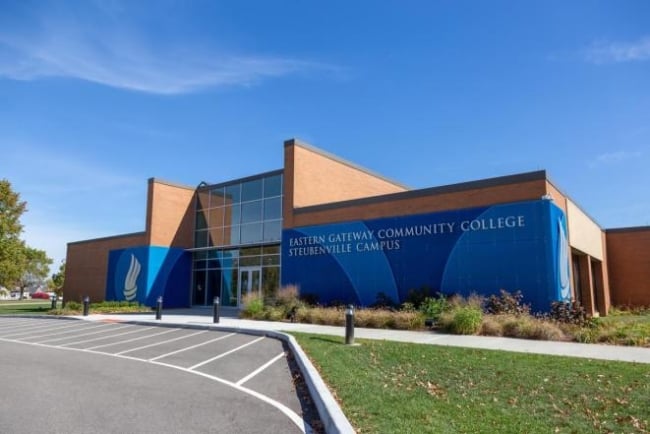You have /5 articles left.
Sign up for a free account or log in.

The U.S. Education Department has told Eastern Gateway Community College to stop enrolling students in its unusual online free college program for union members.
Department of Education
The U.S. Education Department has told Eastern Gateway Community College to stop enrolling students in its unusual online free college program for union members, saying it has violated federal financial aid rules by using some students’ Pell Grant funds to essentially subsidize the enrollment of other students who do not qualify for federal aid.
College officials disputed the department’s characterization and warned that freezing the program weeks before the start of a new term could disenfranchise nearly 25,000 students who are union members and “severely endangers the future of EGCC and its ability to operate.”
The Free College Benefit program at Eastern Gateway Community College promises American Federation of State, County, and Municipal Employees members and their families the opportunity to earn a college degree “with no out-of-pocket cost for tuition, fees, or books after any federal or employer grants are applied.” The school charges for tuition, fees and books, though grants or scholarships ensure that students do not pay. The union program has swelled enrollment at Eastern Gateway to nearly 47,000 students, almost all of whom are non-Ohioans, and raised questions from regulators about the college’s unusual partnership with an outside provider and its finances.
Only students with exceptional financial need are eligible for federal Pell Grants, which provide up to $6,895 per year in education assistance. In Eastern Gateway’s Free College Benefit program, the Department of Education determined that the college charged Pell-eligible students the full amount of their grants but nothing more. The college reduced the bills for non-Pell-eligible students also to zero, logging the waivers as external scholarships but essentially using excess Pell funds to subsidize the education of those learners.
The Education Department said in its July 18 letter that by charging students that it determined to have less financial need less than their Pell-eligible peers, Eastern Gateway violated federal financial aid guidelines.
In a letter to Education Department officials Tuesday, EGCC president Michael Geoghegan disputed the department’s position that the non-Pell students whose educations are being subsidized are necessarily less well-off than their Pell-eligible peers. Students are ineligible for Pell Grants for many reasons, he wrote, including “lack of personal financial information, immigration status, last-minute changes in plans, or other factors.”
He asserted that the program “simply ensures that all students can attend college free of charge, regardless of their Pell eligibility.”
The financial aid issues raised by the Education Department are the latest developments surrounding the Eastern Gateway program, which produced “explosive growth” in the college’s online programs. But it has drawn scrutiny because it was delivered in partnership with the Student Resource Center, a for-profit online program manager. Also, some have raised concerns that the college had hired too few faculty and staff members to support the enrollments and had insufficient quality controls in place to ensure a high-quality education.
Eastern Gateway’s accreditor, the Higher Learning Commission, placed the college on probation in November 2021 for failing to deliver a “high quality educational experience for students,” and the Education Department said in January that it would investigate the program’s use of financial aid, resulting in this week’s letter.
Meanwhile, the relationship between Eastern Gateway and its for-profit partner has devolved.
In May, EGCC charged that the Student Resource Center had breached their collaboration agreement by firing its then CEO and other top officials. Geoghegan and the former CEO, Michael Perik, had known each other for years after working together at another Ohio community college.
In June, the Student Resource Center sued Eastern Gateway for breaking their collaboration agreement and allegedly wooing some of the unions to work directly with the college to “develop, offer, and market online courses” to union and professional association members. Last week a federal judge issued a preliminary injunction preventing the college from walking away from its agreement with the company. The stakes are high, as 95 percent of Student Resource Center’s revenue comes from the collaboration, according to the lawsuit.
Meanwhile, in June, the current owners of the Student Resource Center, Sterling Small Market Education Fund and SRC Intermediate Holdings, sued Perik and the other former SRC managers, alleging that in the process of selling their company to Sterling last spring, they purposely failed to disclose that the Eastern Gateway program was under review by its accreditor.
The owners asserted that they were caught off guard when, months later, the accreditation board placed the school on probation. The probation, the lawsuit claims, undermined Student Resource Center’s “ability to fulfill its education mission and impact.”
The Free College Benefit program’s website now reads, “The Free College program has been suspended as our higher education partners resolve regulatory compliance issues related to the program. [The union] and its higher education partners disagree with this determination, and discussions are ongoing. However, until the Department of Education changes its opinion, the program may not be offered in its current form.”








